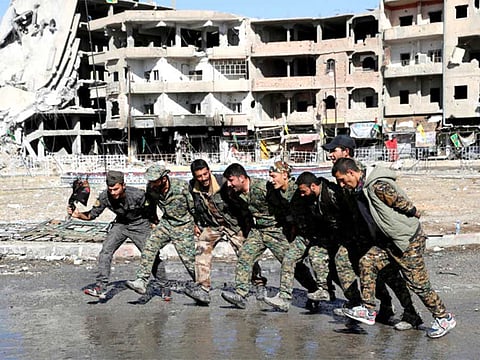Liberation of Raqqa brings new dilemma
Without a common enemy to unite them, US allies who fought Daesh together return to fighting one another

One might expect United States President Donald Trump to take a victory lap after last week’s liberation of Raqqa from Daesh (the self-proclaimed Islamic State of Iraq and the Levant). Thanks to American air power, Maoist Kurds, Syrian patriots and US special operators, this ‘caliphate’ ended as the shortest-lived in Islamic history.
Yet, the US president chose not to exploit this win. The White House issued a five-paragraph statement. Much of the week before last was consumed with the president’s feud over his phone call to the mother of one of the soldiers killed in Niger.
How to explain the subdued reaction? (After all, this White House is desperate for policy wins.)
It’s the geopolitical equivalent of “Mo Money Mo Problems”. Success brings new challenges. In this case, the eclipse of Daesh reopens old rifts in the Middle East that were paused to defeat a universally loathed enemy. Even the US and Iran could cooperate (tacitly) against an outfit that operated sex-slave markets and attempted genocide.
Now all of this fair-weather esprit de corps is gone. One glaring example is in northern Iraq, where the Iraqi Security Forces advanced on Kurdish Peshmerga positions, following their recapture of Kirkuk, the oil-rich city Kurdish forces protected from Daesh in 2014. But there are small examples as well. In Raqqa, there are now reports that the Kurdish YPG militia have started taking down Syrian revolutionary flags favoured by Arab members of the opposition forces that liberated the city, according to Jennifer Cafarella, senior analyst with the Institute for the Study of War.
This says nothing of the new tensions between the US and Iran in Iraq. Last week, US Secretary of State Rex Tillerson earned a rare public rebuke from the Iraqi prime minister’s office after he called on Iranian-supported militias fighting Daesh to return home, now that the fight is coming to a close. Only two years ago, the US was providing air support for ground offensives led by these militias in that fight.
Cafarella told me that one of the problems with the US strategy against Daesh is that it was almost purely a military one, without the much-needed political component necessary for winning peace. “What we have not addressed are larger institutional and societal challenges that gave rise to [Daesh] to begin with, and are now fuelling the cascading crisis in Iraqi Kurdistan,” she said. “The very best example of that is that we have ignored and overlooked Iran’s penetration into the Iraqi Ministry of Interior and the Ministry of Defence.”
In many ways, this is an old story. Iran’s penetration into these institutions had vexed former US president George W. Bush before he decided to “surge” troops into Iraq and pursue a counter-insurgency under the leadership of General David Petraeus. One of the White House staffers who argued for that strategy was Brett McGurk, the American diplomat who went on to forge the coalition against Daesh. At the time, the US pursued terrorists in Iraq, targeting any groups that threatened the elected government. Much of that strategy relied on a close partnership between Bush and the Iraqi prime minister at the time, Nouri Al Maliki.
Eventually, Al Maliki, a Shiite, succumbed to sectarianism. Under Obama, he pursued a ruthless campaign against Sunni groups in the west of the country, laying the ground work for the rise of Daesh. Al Maliki reasoned that if Obama was intent to leave, he best make his peace with Iran. After Daesh began to take territory and went on a rampage in 2014, Obama abandoned his non-interventionism. He instructed McGurk to find an alternative that summer. That alternative became Haider Al Abadi, who ascended to be prime minister that September. The Iranians supported Al Maliki in that power struggle and eventually lost.
Today, Al Abadi is at a crossroads again. His security forces have pressed ahead into Kurdish areas over the objections of the US government — though a ceasefire was said to have been reached on Friday before last. The situation threatens to pit two Iraqi forces, both supported and armed by the US government, against one another, even though only a month ago they were cooperating against Daesh.
It follows a certain depressing logic. Without an enemy to unite them, America’s allies in the Middle East return to fighting one another.
— Bloomberg
Eli Lake is a Bloomberg View columnist. He was the senior national security correspondent for the Daily Beast and covered national security and intelligence for the Washington Times, the New York Sun and UPI.


